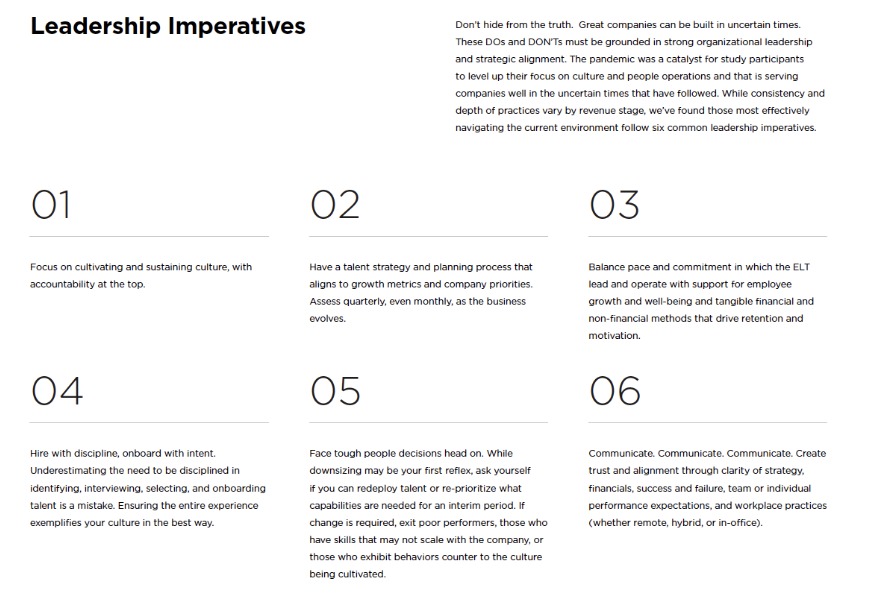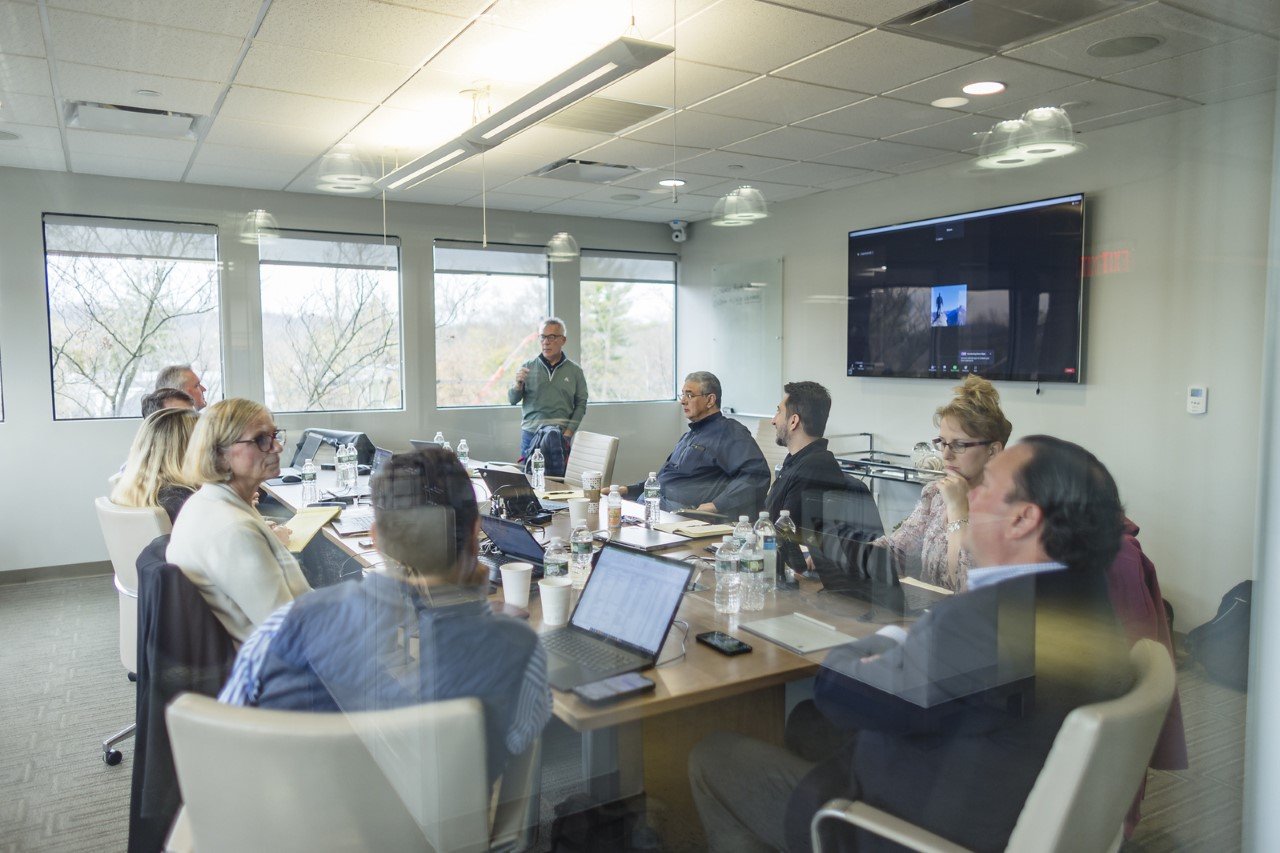While we are surrounded by a constant drumbeat of layoff news for companies of all stages, many high growth companies continue to scale, expand, and innovate their products and services. If you are lucky enough to be in the latter category, ask yourself this question: Are you investing the same effort in building a sustainable and intentional talent strategy and review process?
If you are, kudos. If not, the future of your company may depend on your next step.
Recently, Edison Partners sponsored its annual Growth Index survey focused on The Do’s and Don’ts of Growth Companies during Uncertain Times. As part of this periodic report, we also outlined a set of fundamentally strategic leadership imperatives, which we will revisit in a series of posts over the course of 2023.

Building A Cadence of Executive Team Talent Dialogue
Several years ago, I was the incoming Chief People Officer and newest member of an executive leadership team. Early in my tenure, I led my colleagues through a talent review of the top two levels of the organization. As I put up a slide aggregating themes from their feedback and recommendations to start our session, I sensed discomfort. It was clear that we were about to engage in a level of open and honest discussion unfamiliar to many and playing out for the first time ever. Each of my colleagues would be asked to explain their rationale, advocacy, or defense of the “why” and “what” of performance and potential using a traditional 9-box grid to drive the discussion. And what had formerly been a siloed exercise with the CEO would become (appropriately) an open forum where individual leadership and talent development capability (or lack thereof) would be revealed.
Over the years, I have had the good fortune to facilitate many executive team talent conversations. Higher performing executive teams are more likely to be effective in these critical processes when a foundational framework is present through practiced norms, clarity of process and purpose, cross-team alignment on team and organizational performance goals and measures, and the presence of a team culture grounded in candor and evidence-based feedback and decision making.
In contrast, the absence of these behaviors and processes will lurk in the broader leadership and talent system, or organizational culture, and become undermining and damaging. All too often high-growth executive leaders fail to realize the extent of, nor take ownership of, the problem until a key performer leaves or team effectiveness wanes.
The Value of Accountable Preparation
Done well, growth-company executive teams who begin to embed intentional talent management practices must also learn to be situationally prepared for these critical leadership discussions (including those with boards or compensation committees) and be ready for healthy debate and greater awareness through peer observations and experiences of the people in your charge. These discussions might also reflect your ability to develop and discern the quality of current and future talent as the company grows.
Additionally, leaning into evidence-based talent discussions require uncomfortable conversations. While these conversations about people may be difficult, they are necessary, and pay dividends along your company growth journey.
I have come to find when coaching C-level clients that situational confidence and competence during these review and assessment sessions differ greatly, and ultimately uncover personal leadership strengths or weaknesses at a most critical time.
I recall one COO who showed accountability as the session began by making sure the full executive team understood their responsibility to develop and retain their best people, all balanced by a realistic assessment about the future of others. At the same time, while her peers were excited about the positive messages passed along to their best talent as a result of the talent session, there was also a degree of dread or fear for the resultant conversations with those leaders who, up until that point, lacked an accurate view of their performance and potential or might have limited upside options to consider going forward.
Another client struggled with these executive talent sessions and froze in the moment. He would back off, acquiesce to strong push back, or would request time to process and revisit conversations “off-line”. While this type of discomfort may reveal a personal style challenged by pivotal moments it may also be revelatory of team politics, lack of discipline, or general team dysfunction. In these instances, the power and impact of a strategic HR leader or outside facilitator can make a real difference through effective advisorship and facilitation. However, the accountability for preparation and advocacy sits with each member of the executive team.
To understand the role of accountable talent advocacy and process, I suggest high-growth company executives read three connected articles by a friend and industry colleague Marc Effron, CEO of the Talent Strategy Group who focus on the practice and science of talent management.
- The Accountability Ladder , which offers insight into the “hierarchy of consequences” both good and bad for leaders to govern and guide their roles and more importantly, focusing ways to increase talent accountability for the executive team and through a company.
- It’s Not About The Boxes: The 9-box Grid and What Really Matter which focuses on the process of effective talent review discussions beyond a filling the box exercise.
- What’s Your Talent Philosophy: which focuses on the importance of executive team alignment on how to best manage talent to achieve your business strategy.
How do I start becoming a better and more accountable talent advocate?
Simply, become an advocate when it counts the most.
You may have found yourself responding to an unhappy or unreasonable customer, colleague, or client about someone on your team. When faced with that scenario, how would you feel, and what would you do? What if you were to agree or side with the perspective and premise of the feedback? What would you do if the approach that your team member took had your support in advance?
Recently, a high-growth company client executive had a poor meeting outcome with the company COO. This person’s boss (and peer of the COO) went ahead and stepped up in two ways: as a coach, and as a talent advocate. He listened to the feedback and concerns of the COO, reasserted the why and importance of the meeting, and ultimately, supported the findings. He understood the fine line played in his employee’s role, her gifts, and her areas for growth, and recognized that while the content and output was sound, maybe the delivery approach could best be handled a little differently. After the call, he made clear that she had his full support and would coach her further on the process of influence and being an effective internal consultant.
Appreciably, implementing a culture of intentional talent management practices, blends a commitment to process discipline and nuance to the art of advocating in the presence of executive peers or for someone else like the above story.
Either way, as a company or as an executive, a reputation for accountable and supportive talent advocacy, is one more reason people will seek you out, rather than seek the door.


